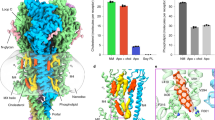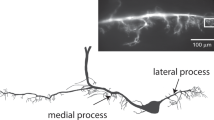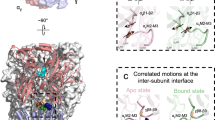Abstract
AT the frog neuromuscular junction, acetylcholine (ACh) induces fluctuations of the membrane potential1 or current2, from which one can evaluate the intensity and the duration of the ‘elementary current’ flowing through individual ionic channels. The observation that the duration of the elementary event increases with hyperpolarisation2 has provided an explanation for the fact that, when ACh is applied at the end plate in long pulses, the total ACh current increases more with hyperpolarisation than does the elementary current3,4. By studying the currents induced by ACh on Aplysia neurones, we have observed a similar phenomenon. But we have discovered that in the presence of curare the total ACh current increases little or even decreases with hyperpolarisation, while the elementary current behaves as in control conditions. The analysis of this phenomenon suggests that, in our preparation, most of the binding of curare does not occur on the free ACh receptor, as in the frog, but rather follows the binding of ACh. It also suggests that the binding of curare is voltage dependent.
This is a preview of subscription content, access via your institution
Access options
Subscribe to this journal
Receive 51 print issues and online access
$199.00 per year
only $3.90 per issue
Buy this article
- Purchase on Springer Link
- Instant access to full article PDF
Prices may be subject to local taxes which are calculated during checkout
Similar content being viewed by others
References
Katz, B., and Miledi, R., J. Physiol., Lond., 224, 665–669 (1972).
Anderson, C. R., and Stevens, C. F., J. Physiol., Lond., 235, 655–691 (1973).
Rang, H. P., Bull. Neurosci. Res. Prog., 11, 220–224 (1973).
Dionne, V. E., and Stevens, C. F., J. Physiol., Lond., 251, 245–270 (1975).
Kehoe, J. S., J. Physiol., Lond., 225, 115–146 (1972).
Adams, P. R., Br. J. Pharmac., 53, 308–310 (1975).
Neher, E., and Sakmann, B., Proc. natn. Acad. Sci. U.S.A., 72, 2140–2144 (1975).
Sheridan, R. E., and Lester, H. A., Proc. natn. Acad. Sci. U.S.A., 72, 3496–3500 (1975).
Cooke, I. M., Leblanc, G., and Tauc, L., Nature, 251, 254–256 (1974).
Furukawa, T., Jap. J. Physiol., 7, 199–212 (1957).
Steinbach, A. B., J. gen. Physiol., 52, 162–180 (1968).
Kordas, M., J. Physiol., Lond., 209, 689–699 (1970).
Gage, P. W., Physiol. Rev., 56, 177–247 (1976).
Adams, P. R., J. Physiol., Lond., 246, 61–63P (1974).
Katz, B., and Miledi, R., J. Physiol., Lond., 249, 269–284 (1975).
Author information
Authors and Affiliations
Rights and permissions
About this article
Cite this article
MARTY, A., NEILD, T. & ASCHER, P. Voltage sensitivity of acetylcholine currents in Aplysia neurones in the presence of curare. Nature 261, 501–503 (1976). https://doi.org/10.1038/261501a0
Received:
Accepted:
Issue Date:
DOI: https://doi.org/10.1038/261501a0
This article is cited by
-
Relaxation studies on the interaction of hexamethonium with acetylcholine-receptor channels inAplysia neurons
Cellular and Molecular Neurobiology (1986)
-
Mechanism of the ganglion-blocking action of bis-ammonium compounds
Neurophysiology (1984)
-
Curare can open and block ionic channels associated with cholinergic receptors
Nature (1982)
-
Curare has a voltage-dependent blocking action on the glutamate synapse
Nature (1979)
-
Slow relaxations of acetylcholine-induced potassium currents in Aplysia neurones
Nature (1978)
Comments
By submitting a comment you agree to abide by our Terms and Community Guidelines. If you find something abusive or that does not comply with our terms or guidelines please flag it as inappropriate.



